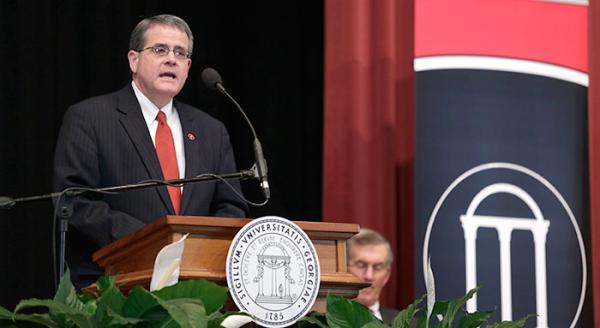UGA President Jere Morehead Wants to Raise Pay for Faculty and Staff

Photo Credit: The University of Georgia
University of Georgia President Jere Morehead will push for raises for faculty again this year, he said during his State of the University speech today at the Chapel.
UGA employees received raises—albeit an average of just 1 percent—last year for the first time since 2008.
"A pool for salary increases was my top legislative priority last year," Morehead said. "I remain grateful to the Board of Regents, the General Assembly, and the governor for supporting it. However, the University of Georgia still lags behind regional and national peers in this regard. That is why improving salaries for faculty and staff will remain a top priority for the foreseeable future.
"Gov. [Nathan] Deal and Chancellor [Hank] Huckaby have proposed another salary increase for the upcoming fiscal year, and I intend to articulate to members of the General Assembly the importance of closing the salary gap between the university and its peer institutions."
Deal's proposed budget includes 1 percent raises for most state employees.
Even with another small raise, UGA faculty will still rank near the bottom in earning power when compared to peer institutions. Associate professors are 11th out of 13, and full professors' pay is dead last, according to a 2014 American Association of University Professors study.
Morehead noted that the university has hired more than 100 new faculty in recent years and created 23 endowed chairs.
To bolster state funding, he has also beefed up fundraising efforts. UGA professors raked in more than $190 million in grants and contracts last year. In addition, donors gave $126 million, bringing the university's endowment over the $1 billion mark.
Other accomplishments Morehead highlighted include:
• breaking ground on the Science Learning Center near Stegeman Coliseum.
• the expansion and renovation of Baldwin Hall.
• construction on the Terry College of Business' Correll Hall, which will open this fall.
• $43 million in state funding for Phase 2 of the $90 million new Terry College complex near Lumpkin and Baxter streets.
• $17 million in state funding for the $23 million Center for Molecular Medicine expansion.
• a Women's Resource Initiative to combat sexual assault on campus.
• a dedicated space in the Tate Center for student veterans.
• a $250,000 endowment for diversity training and to recruit under-represented faculty and students.
• an 85 percent six-year graduation rate.
• extending the freeze on food-service and parking rates for students for the 2015–16 academic year.
• a new "experiential learning" program that will give every student the opportunity to intern, study abroad or conduct a research project.
• replacing an old coal boiler with a cleaner electric-powered one.
• appointing a committee to develop a master plan for historic preservation.
• increasing scholarships by $56 million, or 26 percent.












comments